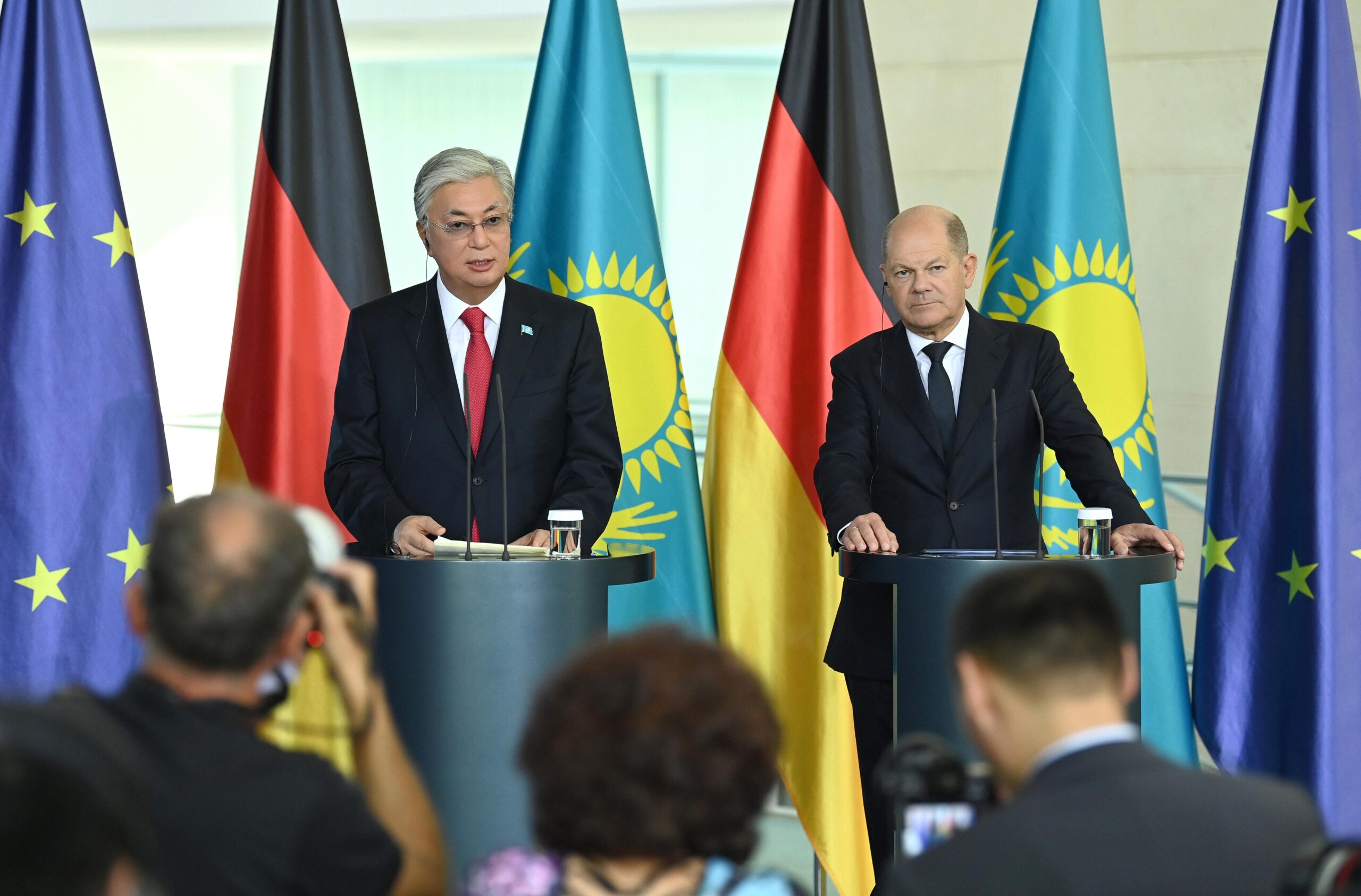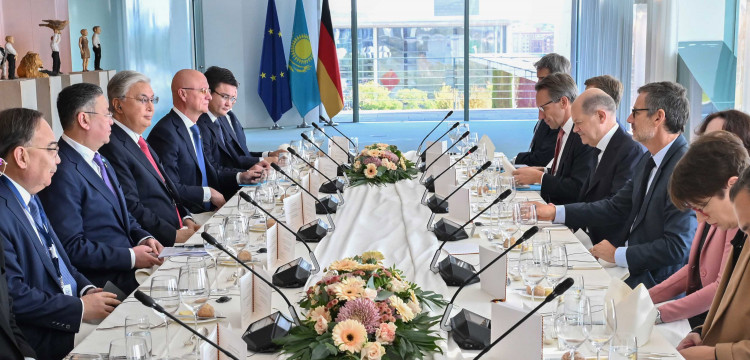ASTANA – Kazakhstan attaches utmost importance to the development of cooperation with Germany, a key partner in the European Union (EU), said Kazakh President Kassym-Jomart Tokayev during a Sept. 28 talks with Germany’s Federal Chancellor Olaf Scholz in an expanded meeting in Berlin, reported the Akorda press service.

President Tokayev and Olaf Scholz on Sept. 28 in Berlin. Photo credit: Akorda.
Germany is one of Kazakhstan’s largest trading partners and a leading investor. Kazakhstan accounts for nearly 83% of Germany’s total trade with the Central Asian region, with bilateral trade turnover increasing by 25% to $2.8 billion by the end of 2022.
Busy agenda of interaction and cooperation
During the talks, the President emphasized the potential for strengthening trade and economic ties and affirmed Kazakhstan’s readiness to create all necessary conditions for a wider presence of German businesses in Kazakhstan’s market. Priority areas include oil and gas chemistry, rare-earth metallurgical industry, green energy, transport and logistics, and agriculture.

Photo credit: Akorda.
Tokayev proposed creating a consortium for joint raw materials projects, supported by a bilateral working group on project financing and involving private German investors.
Focusing on strengthening cooperation in the transit and transport sector, Tokayev urged the German side to exploit the potential of the Trans-Caspian International Transport Route (TITR) and to participate in the infrastructural development of the Caspian seaports of Aktau and Kuryk.
Tokayev also encouraged German partners to establish closer cooperation to develop renewable energy sources, including green hydrogen. In this regard, he reiterated the importance of the project for the production of green hydrogen in the Mangystau Region, which is being implemented with the German-Swedish company Svevind Energy.
During the meeting, the President mentioned the possibility of simplifying the visa regime for the citizens of Kazakhstan.
Scholz affirmed Germany’s interest in expanding comprehensive cooperation with Kazakhstan and confirmed a strong willingness to deepen trade, economic, and investment relations with Kazakhstan. Notably, the German side expressed interest in increasing oil supplies, diversifying supply chains, and implementing infrastructure projects.
Scholz emphasized the importance of establishing an intensive exchange in the use of green energy, the joint promotion of the climate agenda, and enhancing efforts to create favorable conditions for representatives of small and medium-sized businesses of the two countries.
Outlining priorities at press conference
Tokayev noted that talks had once again reaffirmed the mutual commitment of the two sides to deepen Kazakh-German relations. He spoke about the energy sector as one of the priority areas for cooperation.
“According to our agreements, since the beginning of this year, Kazakhstan has sent 500,000 tons of oil to Germany through the Druzhba trunk oil pipeline. At the request of the German partners, I confirmed Kazakhstan’s readiness to increase the volume of supplies and to sustain them over the long term,” said Tokayev.
According to Tokayev, there are also broad prospects for partnerships in agro-industrial, finance, innovations, and digitalization.
“Today, we cooperate with banks such as Deutsche Bank, Euler Hermes, KfW, and regional financial structures to finance economic projects. To expand this list, we are inviting German financial institutions for closer cooperation,” the President noted.
Special attention during the talks was paid to cultural and humanitarian relations. Tokayev welcomed the establishment of new Kazakh-German educational institutions, notably the Kazakh-German Institute of Sustainable Engineering, which opened in Aktau in June this year.
Tokayev invited Scholz to pay an official visit to Kazakhstan to maintain a high level of cooperation between the countries.
Scholz noted that Kazakhstan is Germany’s leading trade and economic partner in Central Asia. He highlighted the importance of expanding cooperation in energy, sustainable development, digitalization, and combating climate change.
According to Scholz, Germany and the EU fully support the reforms initiated by President Tokayev in Kazakhstan.
Kazakhstan’s position on the conflict in Ukraine
Answering questions from the media about Kazakhstan’s relations with Russia and the country’s position on the conflict in Ukraine, Tokayev said Kazakhstan and Russia have a longstanding tradition of cooperation, including in trade and humanitarian fields. The countries signed a Treaty on Allied Relations in 2013.
“Regarding the Ukrainian conflict, Kazakhstan stands for an immediate cessation of hostilities and initiating peace talks based on the United Nations (UN) Charter principles. Today, I told the Chancellor that the situation is dire. Russian and Ukrainian sides claim to be ready for negotiations, but the platform for negotiations is extremely unclear. Therefore, an era of reasonable, rational – indeed, I would say, wise diplomacy is coming. Mutual accusations must stop. We need to find a basis for peaceful negotiations acceptable to both sides. Kazakhstan supports all efforts made by relevant states and groups of states proposing various options for resolving the Ukrainian conflict. On our part, we will make every effort. As for the border between Kazakhstan and Russia, it has been delimited and largely demarcated, as well as confirmed and ratified by the two countries’ parliaments. Therefore, we do not have any concerns about territorial claims by Russia. We maintain regular friendly contacts on a bilateral basis, as well as within the framework of the relevant integration associations,” said Tokayev.


